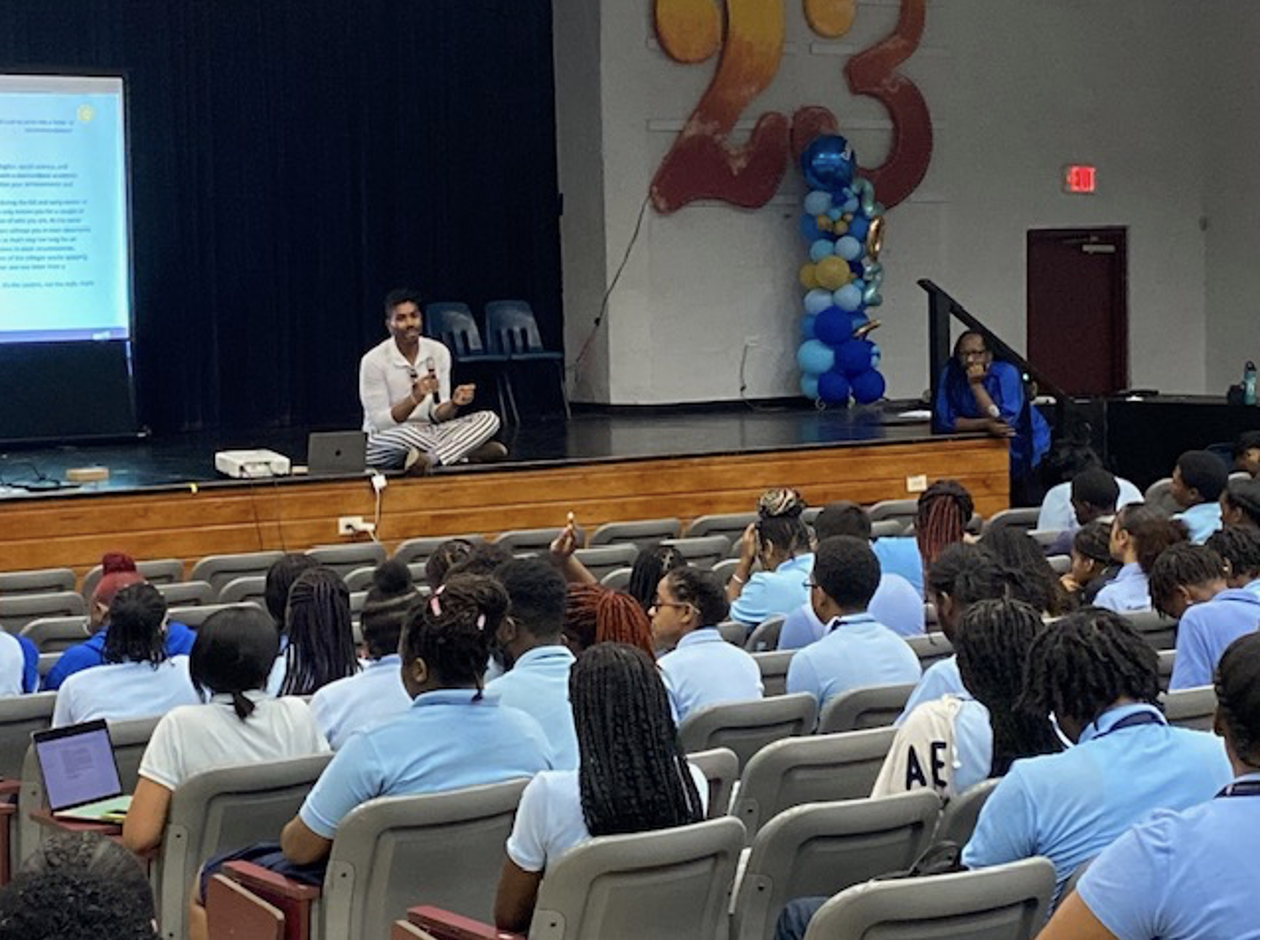Life's about options, even when preparing for college applications. Students can work with three types of counselors: a school counselor, an independent education counselor, or a private college counselor. What's the difference, and who's the best choice?
College counselors, both private and school counselors, play a critical role in helping students prepare for college applications. Although some students go about the college admissions process alone (kudos for that!), others find it helpful to work alongside an admissions professional who knows the process and can offer guidance every step of the way.
For families interested in having an extra pair of hands to help out during the college application process, there are a few things to consider. Namely, whom should your student work with? In this blog, we'll be breaking down the role of each counselor, the pros and cons of working with them, and how to choose the best fit for you.
Table of Contents
- What is a School Counselor?
- What is an Independent Education Counselor?
- What is a College Counselor?
- School Counselor vs. Independent Counselor vs. College Counselor: What's Better?
- Should Parents Moonlight as College Counselors?
What is a School Counselor?
Whether your teen attends a private or a public high school, they'll likely be paired with a school counselor during their junior year. School college counselors are key players in helping students navigate course selection, college research, graduation requirements, college and financial aid deadlines, and more.
Pros:
1. They offer their services free of charge
Who doesn't love free advice? Utilizing the expertise of a school counselor can be an invaluable experience for families who may not be able to afford external support.
2. They know local scholarships your teen can apply to
Many students aim to apply for well-known scholarships and overlook the scholarships with smaller awards. Scholarships work the same way as college admissions. The more students apply, the more selective it is. Working with a school counselor familiar with scholarships and bursaries in your local community can help increase your teen's chances of receiving financial aid.
3. Assistance with letters of recommendation
Letters of recommendation act to complement a student's application and offer a key perspective into their character, work ethic, and whether they'd be a good fit for the college (beyond academics).
Most colleges ask for one counselor and 1-2 teacher recommendations. Having a close relationship with a school counselor and someone on the inside to facilitate teacher recommendations can help put students at ease about this portion of the application.
4. Starting on time
Many high schools pair students with a school counselor with significant time to spare in the process. This allows students to think thoughtfully about what courses to take, when to start essays, and how to approach deadlines.
Cons:
1. The student-to-counselor ratio
According to the American School Counselor Association (ASCA), the student-counselor ratio as of 2021-2022 is 408:1. School counselors are experts and excellent at what they do. Still, even for them, it can be challenging to offer students personalized support when working with hundreds of others. This can become particularly challenging as students move closer to deadlines.
What is an Independent Education Counselor?
An Independent Education Counselor (IEC) or independent college counselor is an individual that families hire to guide them through the college admissions process. The main difference between an IEC and a school counselor is the freelance nature of their work. IECs work independently and set their own rates. Some IECs may also work for larger consultancies on a contract basis.
Pros:
1. Individual attention
One of the great things about working with an IEC is the personalized support and one-on-one time a student receives. With smaller caseloads, IECs can offer students frequent meetings and quick turnover for communication.
2. Support over the summer
Working with a school counselor is great, but what happens when you have a question, and it's the middle of July? Working with an IEC means your family will have support during the school year and holiday breaks.
3. Emotional and mechanical support
Outside counselors, IEC, and counseling companies, offer great mechanical support on essays, applications, and extracurriculars. But more importantly, they also help students work through their emotions and offer encouragement during stressful periods.
Cons:
1. Cost
IECs working on a contract basis with families can often be expensive and charge similar rates to larger counseling companies. These costs can add up for families, especially considering the costs of sending a student to college.
It's always important to remember that great service and expertise come at a price. Consider if it is the right investment for your family.
2. Disconnect from school
If a family chooses to work solely with an IEC, students may feel disconnected from their school counselor and find themselves in a sticky situation when it comes time to ask for a reference letter for college.
What is a College Counselor?
A college counselor is typically an education professional that works with an organization or counseling company to provide application support to students. Once again, think Collegewise! These counselors differ from IECs in that they are typically full-time or part-time employees and offer services the company has set.
Pros:
1. Resources and more resources
A great benefit of working with a larger company during the college application process is the resources made available to families. From blogs and eBooks to case studies and tip sheets, families have a wide range of resources that answer any question they may have.
2. Partnership perks
Working with a large counseling company like Collegewise, opens families up to opportunities that may not be available to them in their local community or high school. Partnerships can introduce students to extracurricular opportunities such as summer programs and internships to add to their application and CV.
3. Personalized support with broader knowledge
Collegewise takes on a personalized approach when pairing a student with a counselor. We review a student's interests and goals and ensure they're matched with the right professional, where they'll have 1:1 meetings throughout the entire process. But it doesn't stop there. At Collegewise, we have what is referred to as the "Hive Mind," where counselors help each other, utilize their years of experience to offer strategic advice, and evaluate the best outcomes for students.
College consultancies also offer a variety of blind reviews and departmental support to students with experts specializing in that area. For example, students can receive un-bias essay reviews from Collegewise's Essay Review Team or academic tutoring from our Tutoring services. Let's be honest, you're not going to hire a plumber to be your private chef, right? It's the same thought process here.
4. Versatile support
With so many counselors on staff with different strengths and academic focuses, families from different backgrounds and with unique ambitions can work with an expert on the college process. Let's say a student is interested in medical school and seeks to work with a counselor familiar with colleges in the United States and the United Kingdom; in larger companies, there will likely be a handful of counselors with this expertise. The same goes for athletes, liberal arts, or STEM students.
Larger organizations also tend to work with diverse students, given their versatile support offerings. Is your teen a high flyer with 12 extracurriculars, or do they struggle with mathematics and have a 3.2 GPA? It doesn't matter!
5. Decades of experience
Families go through the process once, but college counselors have gone through it thousands of times. Especially large companies that have been operating for many years (did you know Collegewise is the oldest college counseling company? Now you know.).
.png?width=600&height=200&name=Blog%20CTAs%20(7).png)
Cons:
1. Cost
Private college counseling can be expensive, especially if your teen is looking to apply to dozens of colleges. Finding a counseling service with flexible programs is a great way to ensure you stay within your budget.
2. Timing for students
Many families hiring outside support tend to reach out to counselors with only a year or even a few months left. This can be challenging for students and counselors to work on strengthening the application before deadlines.
School Counselor vs. Independent Counselor vs. College Counselor: What's Better?
By now, you should have a better sense of each counselor's role in the process, but how can you decide who the best person is to work with? Our advice is to combine forces!
Working with a school counselor is undoubtedly beneficial to students, and as we mentioned, many families find this is the perfect amount of support their child needs. On the other hand, having an outside counselor who can offer support in addition to working with a school counselor can create a stress-free experience for them.
That's why Collegewise always encourages students to stay closely connected with their school counselors as they continue to work with us. Not only will families receive the benefits of working with a private counselor, but they'll also maintain a close relationship with their school counselor and have more support on the academic side of things.
Should Parents Moonlight as College Counselors?
No, parents should not try to take on the college counselor role. We've all been there and know how stressful the process can be. During that period, it's important that parents stay supportive and trust their teens to navigate the process on their own. Be their cheerleader and not their project manager!




